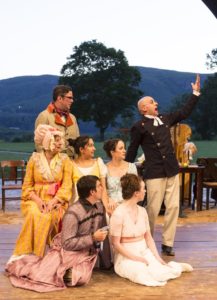 “A success that has outlived its usefulness may, in the end, be more damaging than failure.”
“A success that has outlived its usefulness may, in the end, be more damaging than failure.”
Peter F. Drucker, Management: Tasks, Responsibilities, Practices
Terry Teachout on the arts in New York City
We are never so funny to others as when we are least funny to ourselves. This seeming paradox is the piston that drives the engine of comedy. In the greatest of all comedies—the Shakespearean tales of romantic reconciliation and their operatic counterparts, Verdi’s Falstaff and Mozart’s Marriage of Figaro and Così fan tutte—a pompous man’s thick carapace of earnestness is penetrated by humiliation. All at once, the unwitting butt of the joke realizes that he, too, partakes of the human condition, and is thereby made whole. It is in these transformative moments that the moral force of comedy is most evident…
Read the whole thing here.
 “Street Scene,” a wordless vignette created and directed by Ernie Kovacs. The soundtrack is an excerpt from Béla Bartók’s Concerto for Orchestra. This clip comes from Kovacs on Music, which was originally telecast on NBC on May 22, 1959:
“Street Scene,” a wordless vignette created and directed by Ernie Kovacs. The soundtrack is an excerpt from Béla Bartók’s Concerto for Orchestra. This clip comes from Kovacs on Music, which was originally telecast on NBC on May 22, 1959:
(This is the latest in a series of arts-related videos that appear in this space each Monday, Wednesday, and Friday)
In today’s Wall Street Journal drama column, I review two Hudson Valley Shakespeare Festival premieres, Kate Hamill’s Pride and Prejudice and Lauren Gunderson’s The Book of Will. Here’s an excerpt.
* * *
What does it mean to be a “Shakespeare festival” in the second decade of the twenty-first century? Like many such enterprises, the Hudson Valley Shakespeare Festival is in the process of broadening its once-sacrosanct repertory, so much so that two of its three current mainstage productions are premieres. One, however, is a play about Shakespeare, while the other is a new adaptation of a novel as classic—and familiar—as anything the Bard ever wrote. The biggest and best news, though, is that both plays are the stuff hits are made of…
 Kate Hamill, whose stage versions of “Sense and Sensibility” and “Vanity Fair” were deservedly successful, has now turned her hand to a second Jane Austen novel, “Pride and Prejudice.” You wouldn’t think she’d have anything fresh to say about a book that to date has been filmed a half-dozen times (not counting “Pride and Prejudice and Zombies”) and put on the stage at least as often. You’d be wrong, though, for the ever-ingenious Ms. Hamill has given us something completely and delightfully different, a smallish-cast period-dress “Pride and Prejudice” that she’s done over in the revved-up manner of a Hollywood screwball comedy. The language is traditional but the approach is thoroughly modern, with six of the eight actors playing multiple roles, four of them in drag. Cleverly compressed—one of the five Bennet sisters has vanished into the memory hole—and adapted with fizzy, festive freedom, Ms. Hamill’s “P&P” is full of “Bringing Up Baby”-style slapstick and the kind of barely controlled chaos that you’d expect to see in a five-door Feydeau farce….
Kate Hamill, whose stage versions of “Sense and Sensibility” and “Vanity Fair” were deservedly successful, has now turned her hand to a second Jane Austen novel, “Pride and Prejudice.” You wouldn’t think she’d have anything fresh to say about a book that to date has been filmed a half-dozen times (not counting “Pride and Prejudice and Zombies”) and put on the stage at least as often. You’d be wrong, though, for the ever-ingenious Ms. Hamill has given us something completely and delightfully different, a smallish-cast period-dress “Pride and Prejudice” that she’s done over in the revved-up manner of a Hollywood screwball comedy. The language is traditional but the approach is thoroughly modern, with six of the eight actors playing multiple roles, four of them in drag. Cleverly compressed—one of the five Bennet sisters has vanished into the memory hole—and adapted with fizzy, festive freedom, Ms. Hamill’s “P&P” is full of “Bringing Up Baby”-style slapstick and the kind of barely controlled chaos that you’d expect to see in a five-door Feydeau farce….
 Lauren Gunderson’s “The Book of Will,” Hudson Valley’s second premiere, is a different sort of period piece, a play about the posthumous publication in 1623 of the First Folio, in which fully authentic texts of most of Shakespeare’s plays saw print for the very first time. If that sounds like dry-as-dust pedantry to you, fear not: Ms. Gunderson, whose plays are hugely popular outside New York but has yet to receive a major production in Manhattan, has given us a serious comedy, by turns charming and darkly poignant, in which a history lesson is embedded so gracefully that you’ll scarcely know you’ve been schooled….
Lauren Gunderson’s “The Book of Will,” Hudson Valley’s second premiere, is a different sort of period piece, a play about the posthumous publication in 1623 of the First Folio, in which fully authentic texts of most of Shakespeare’s plays saw print for the very first time. If that sounds like dry-as-dust pedantry to you, fear not: Ms. Gunderson, whose plays are hugely popular outside New York but has yet to receive a major production in Manhattan, has given us a serious comedy, by turns charming and darkly poignant, in which a history lesson is embedded so gracefully that you’ll scarcely know you’ve been schooled….
* * *
Read the whole thing here.
The trailers for Pride and Prejudice and The Book of Will:
An ArtsJournal Blog